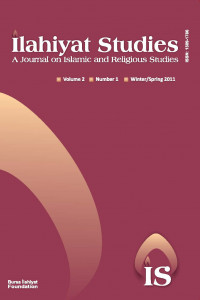Abstract
Keywords
Time and space relevance Qurʾānic text Islamic theology Islamic philosophy Islamic Sufism logoi kairos
References
- Açıkgenç, Alparslan, “İslam’da Bilgi Nazariyesi [Epistemology in Islam],” in Bünyamin Erul (ed.), İslam’a Giriş – Ana Konulara Yeni Yaklaşımlar – [Introduction to Islam – New Approaches to Fundamental Issues –] (4th ed., Ankara: Diya-net İşleri Başkanlığı Yayınları, 2008), 11-30.
- Corbin, Henri, Avicenna and the Visionary Recital (trans. from French by Willard R. Trask; Princeton, NJ: Princeton Uni-versity Press, 1990).
- Izutsu, Toshihiko, Creation and Timeless Order of Things: Essays in Islamic Mystical Philosophy (Ashland: White Cloud, 1994).
- Mohamed, Yasien, “The Definition of Fitrah” at http://www. an-gelfire.com/al/islamicpsychology/fitrah/fitrah.html (10.03.2011).
- Moosa, Ebrahim, Ghazālī and the Poetics of Imagination (Chapel Hill & London: The University of North Carolina Press, 2005).
- Smith, P. Christopher, Hermeneutics and Human Finitude (New York: Fordham University Press, 1991).
Abstract
References
- Açıkgenç, Alparslan, “İslam’da Bilgi Nazariyesi [Epistemology in Islam],” in Bünyamin Erul (ed.), İslam’a Giriş – Ana Konulara Yeni Yaklaşımlar – [Introduction to Islam – New Approaches to Fundamental Issues –] (4th ed., Ankara: Diya-net İşleri Başkanlığı Yayınları, 2008), 11-30.
- Corbin, Henri, Avicenna and the Visionary Recital (trans. from French by Willard R. Trask; Princeton, NJ: Princeton Uni-versity Press, 1990).
- Izutsu, Toshihiko, Creation and Timeless Order of Things: Essays in Islamic Mystical Philosophy (Ashland: White Cloud, 1994).
- Mohamed, Yasien, “The Definition of Fitrah” at http://www. an-gelfire.com/al/islamicpsychology/fitrah/fitrah.html (10.03.2011).
- Moosa, Ebrahim, Ghazālī and the Poetics of Imagination (Chapel Hill & London: The University of North Carolina Press, 2005).
- Smith, P. Christopher, Hermeneutics and Human Finitude (New York: Fordham University Press, 1991).
Details
| Primary Language | English |
|---|---|
| Subjects | Religious Studies |
| Journal Section | Research Articles |
| Authors | |
| Publication Date | June 1, 2011 |
| Submission Date | December 26, 2010 |
| Published in Issue | Year 2011 Volume: 2 Issue: 1 |

